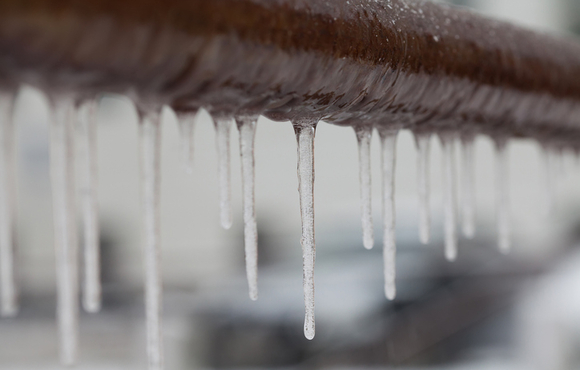ELLICOTT CITY, MD – With temperatures projected to continue to dip well below freezing this week, the County’s Department of Public Works’ Bureau of Utilities is offering residents tips on how to keep pipes from freezing and potentially bursting.
These are everyday tips that can help our residents protect their pipes and ultimately their homes. I encourage all our residents and businesses to take a few moments to check the status of their pipes amid winter's freezing temperatures, it could save you from unwanted and costly damage.
Water pipes located in a crawlspace or on an outside wall are subjected to sub-freezing temperatures, as are pipes located in a garage, attic or any other unheated building. To help combat this problem and reduce the probability of your pipes freezing and bursting, the Bureau of Utilities recommends the following:
- Insulate exposed pipes susceptible to low temperatures.
- Utilize other devices, such as UL approved heat tape, to help keep vulnerable pipes from freezing.
- Leave hot and cold water dripping the thickness of a pencil on nights when temperatures dip below 15°F.
- Some pipes, such as those located in cabinets or vanities, and situated against an outside wall may be insulated but still may be likely to freeze. It is a good practice to leave cabinet/vanity doors open to allow heat in the room to keep pipes warm and prevent freezing.
The Bureau also suggests these simple steps to avoid a water leak and mitigate damage:
- Turn off inside water shutoff valve for any outside hose bib connections and open the outside hose bib to drain the line.
- Know where your home’s inside main water shutoff valve is and check that it is functional by hand. In case of a leak, this valve will turn off water flow coming into the home and thereby limit costly water damage.
- Seal any air leaks that allow icy blasts to reach pipes.
- For homes with crawl spaces, close outside air vents located in the foundation wall during extremely cold temperatures to keep exposed plumbing from freezing.
- Heating costs are driven by outside temperatures and home thermostat settings. It is a false economy to allow inside temperatures to fall below 55 degrees. This creates risk of frozen pipes and it increases energy consumption when trying to restore interior temperature.
- If you are going on an extended vacation, turn off your incoming water service valve, drain water lines from upper levels to lower level. Otherwise set your thermostat to at least 55°F or above.
- Consider installing an Automatic Water Shutoff Valve on the incoming water service line. These automatic valves are able to sense a water leak and automatically respond and shut off water service thereby limiting water leak damage.
Also, to help keep county fire hydrants from freezing and help prevent street flooding, residents are asked to shovel snow away from hydrants in their neighborhood that are covered or obstructed by snow, as well as keeping debris and snow, away from stormwater runoff drains in the roadway.
If your pipes do freeze, the Bureau recommends opening the cold-water faucet nearest the frozen pipe to relieve pressure. Then, use a gentle heat source, such as a light bulb or hair dryer, to thaw the pipe. DO NOT use an open flame.
Residents are also reminded if you experience an issue with your water service or experience a sewage back-up in your home, call the County first to determine if there is a break in the water main or a blockage in the sewer main beyond your property. During regular business hours, residents are instructed to call the Bureau of Utilities at 410-313-4900. After hours and on the weekends, call Central Dispatch at 410-313-2929 which will then notify a county utility worker.
Residents can also stay up-to-date on the latest Bureau of Utilities emergency and upcoming scheduled repairs, as well as other useful information, by visiting the Bureau’s website or signing up for its e-newsletter.
